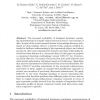Free Online Productivity Tools
i2Speak
i2Symbol
i2OCR
iTex2Img
iWeb2Print
iWeb2Shot
i2Type
iPdf2Split
iPdf2Merge
i2Bopomofo
i2Arabic
i2Style
i2Image
i2PDF
iLatex2Rtf
Sci2ools
128
click to vote
EVOW
2006
Springer
2006
Springer
Mining Structural Databases: An Evolutionary Multi-Objetive Conceptual Clustering Methodology
Abstract. The increased availability of biological databases containing representations of complex objects permits access to vast amounts of data. In spite of the recent renewed interest in knowledge-discovery techniques (or data mining), there is a dearth of data analysis methods intended to facilitate understanding of the represented objects and related systems by their most representative features and those relationship derived from these features (i.e., structural data). In this paper we propose a conceptual clustering methodology termed EMO-CC for Evolutionary Multi-Objective Conceptual Clustering that uses multi-objective and multi-modal optimization techniques based on Evolutionary Algorithms that uncover representative substructures from structural databases. Besides, EMO-CC provides annotations of the uncovered substructures, and based on them, applies an unsupervised classification approach to retrieve new members of previously discovered substructures. We apply EMO-CC to the...
Artificial Intelligence | Conceptual Clustering | EVOW 2006 | Representative Substructures | Uncovered Substructures |
| Added | 22 Aug 2010 |
| Updated | 22 Aug 2010 |
| Type | Conference |
| Year | 2006 |
| Where | EVOW |
| Authors | Rocío Romero-Záliz, Cristina Rubio-Escudero, Oscar Cordón, Oscar Harari, Coral del Val, Igor Zwir |
Comments (0)

